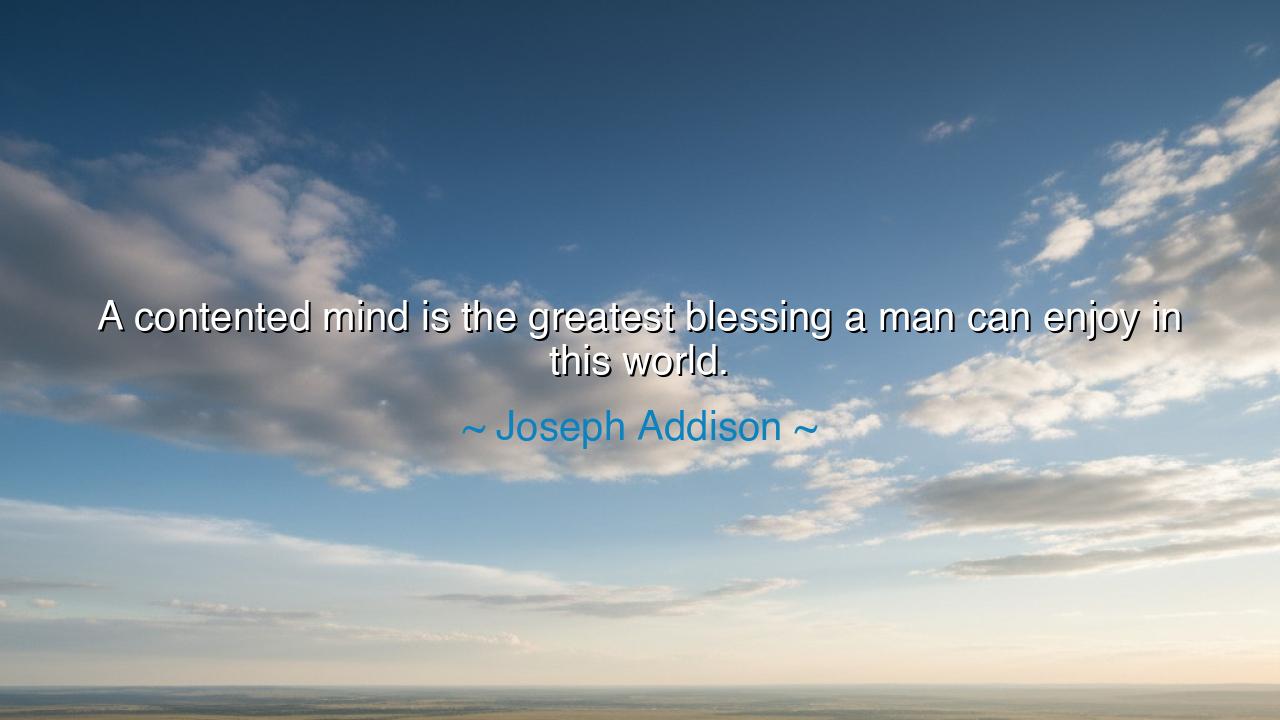
A contented mind is the greatest blessing a man can enjoy in this






Hear now the gentle and timeless wisdom of Joseph Addison, a philosopher of the heart and an observer of human nature, who once wrote: “A contented mind is the greatest blessing a man can enjoy in this world.” In this simple yet profound sentence lies the secret that sages, poets, and saints have sought for millennia — that true wealth is not measured in gold, nor fame, nor conquest, but in contentment, that serene and unshakable peace which resides in a heart at rest. For what is a kingdom to a restless spirit, or glory to a troubled soul? The contented mind, though it owns nothing, possesses all things.
Addison, an English essayist of the early 18th century, lived in an age of elegance and ambition, when men raced for power, honor, and position. Yet, amid the noise of politics and the pursuit of fortune, he saw how few found happiness. Many achieved their desires only to discover emptiness within. So he wrote often of virtue, of moderation, and of that inward harmony that gives peace regardless of circumstance. When he spoke of the greatest blessing, he did not mean the fleeting pleasures of the senses or the favor of kings, but the tranquil joy of one whose heart is free from envy, fear, and greed — the contented mind that dwells in gratitude and calm.
For what, indeed, is contentment? It is not the death of desire, but its transformation. It is to desire rightly — to wish not for all things, but for the right things. It is the art of finding enough in what one has, of looking upon life with quiet appreciation rather than endless hunger. The contented man may labor and strive, yet he does so with serenity, not desperation. He measures success not by comparison with others, but by the peace that lives within him. As the ancients said, “He who is rich is not he who has much, but he who wants little.”
History gives us countless examples of this truth. Consider Diogenes, the philosopher of ancient Greece, who lived in a barrel with nothing but his lamp and his wisdom. When Alexander the Great stood before him and said, “Ask anything of me, and I will give it to you,” Diogenes simply replied, “Then stand out of my sunlight.” In that moment, the conqueror of the world stood humbled before the conqueror of desire. For Alexander could command armies but not his own heart, while Diogenes, who had nothing, lacked nothing. Such is the power of a contented mind — it bows to no master and fears no loss.
Yet contentment is not a gift that falls from heaven; it is a discipline of the soul. It must be cultivated like a garden, tended daily with gratitude and simplicity. Many seek happiness in the widening of their possessions, but it comes instead from the narrowing of their wants. To awaken each morning and give thanks for breath, for sunlight, for bread upon the table — this is the beginning of peace. To look not always at what is missing, but at what is present, is to train the heart to rest. And in that rest, one discovers the quiet joy Addison called the greatest blessing.
In our age, where desires multiply faster than they can be fulfilled, the lesson of Addison shines brighter than ever. The modern soul is pulled in a thousand directions — toward wealth, validation, endless novelty — yet finds itself empty amid abundance. The remedy lies not in gaining more, but in wanting less. To be content is not to surrender ambition, but to temper it with wisdom. Pursue excellence, but do not let it rob you of peace. Work, but let your labor serve meaning, not vanity. For the man who is content within can walk through storms without fear, while the man who is restless will find no shelter even in calm.
So let this be your teaching, my child: seek a contented mind, for it is the foundation of all joy. Guard it as you would a treasure, for it is worth more than fame, more than riches, more than the approval of men. Each day, look upon what you have and whisper, “It is enough.” Each night, forgive what you lack and rest in gratitude. The world will call you foolish for being satisfied, but know this — the discontented chase shadows, while the contented dwell in light.
Thus, the wisdom of Joseph Addison endures: “A contented mind is the greatest blessing a man can enjoy in this world.” The one who masters this art needs no fortune, for he carries peace within him. The seas of life may rise and fall, yet his spirit remains still, like a lantern in the night — shining not because of what it holds, but because of what it has let go.






AAdministratorAdministrator
Welcome, honored guests. Please leave a comment, we will respond soon